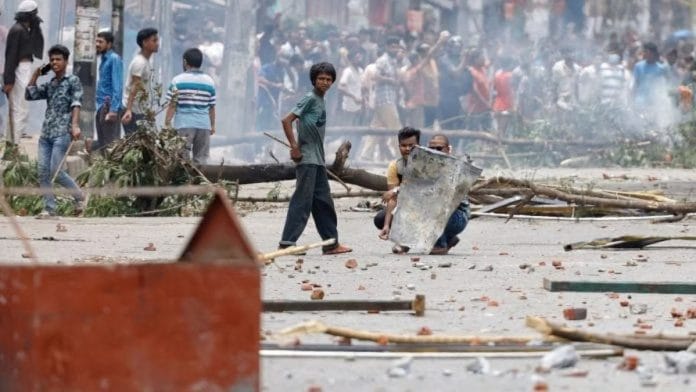New Delhi: In the aftermath of Sheikh Hasina’s ouster, Bangladesh is seeing the repeat of an old phenomenon—the weaponisation of legal processes and slapping of false charges to harass political dissidents, and the extortion of innocents. The FIRs lodged in connection with the killings during the July uprising name a large number of people, many of whom say they had nothing to do with the violence.
Sharing a 22 November BBC Bangla report on this, Hasina’s son Sajeeb Wazeb, last Friday, claimed in a social media post that the phenomenon was “a manifestation of a farcical trial process unfolding in the country under the unelected Yunus regime”.
The Muhammad Yunus-led Bangladesh interim government completed its 100 days on 15 November.
Though the previous Hasina government was also accused of targeting critics with trumped-up charges, the interim government has been promising political reforms since taking charge. However, with the reality seeming far from it, many are now starting to question the administration.
At the heart of the problem are some parents of the protesters slain during the July uprising, with some of them manipulated into filing baseless police complaints against a large number of people. The complaints, the BBC reported, are often part of a broader racket for extorting money in exchange for retracting or modifying the charges. To clear their names, those falsely accused or their family members are asked to pay up—sometimes up to 7,00,000 Bangladeshi taka.
Saidur Rahman, chief executive of the Foundation for Human Rights Culture, a human rights organisation in Dhaka, told ThePrint that after the July uprising, the police rarely filed any cases by themselves. The victims’ families have mostly filed complaints via civil or legal help. However, he alleged, the police are changing and adding a few names from their end as well, considering they themselves were the perpetrators of the violence in July.
“A victim’s family has to do ‘mamla (case)’ against the perpetrators via the police. The government here cannot individually assist each family. It also has to go through the police and their reports. In such cases, it is important to file FIRs carefully because, so far, no proper legal procedure has been applied to help the families, and these false cases might weaken the actual cases where justice is still pending,” Rahman said.
Dark side of justice
The phenomenon, known as ‘case-smuggling’, appears to be a direct outgrowth of a volatile political environment in Bangladesh. Those familiar with the issue say there have been reports of such cases for years—exacerbated by political rivalries and personal vendettas.
In a recent case reported by the BBC, a mother who lost her college-going son during the July uprising, said that she was pressured into filing a case against 89 people, many of whom she did not know. “I don’t know if they gave it to me deliberately. They asked me to sign a document with these names, and I did so,” she said.
The widespread use of false cases, known colloquially as ‘dhalau mamla (random cases)’, mirrors a dark legacy of politically motivated arrests and legal harassment characterising the years under the Hasina government. Another term, ‘gayebi mamla (false cases)’, arose in those times to describe the practice of charging dissenters with fabricated offences, often leading to their arrest and imprisonment.
Those familiar with the issue say such cases are not just politically motivated but also designed as instruments to exploit the legal system for personal enrichment. Families of victims—often uneducated or unaware of the intricacies of the legal process—are easy targets for political operatives offering to “help” them navigate the complex system during chaotic periods in the country’s history.
The current wave of ‘dhalau mamla’ in Bangladesh appears to be an extension of this culture. The only difference is that the Hasina-led Awami League seems to be on the receiving end. Sources who did not wish to be named said that a significant proportion of the falsely accused in the current cases are from the party or other political opponents of the Yunus government.
Omar Faruk, a senior Bangladesh Supreme Court lawyer who has handled a few such cases, told ThePrint over phone that false cases were on the rise during the initial weeks after the fall of the Hasina regime, but pressure from the civil society, human rights lawyers and the government has curbed such cases now.
“There has been a history of filing false cases in Bangladesh. These were called ‘agyaat namas’ earlier, and money was extorted. The client can then file a lawsuit and sue the petitioner demanding compensation, but that rarely happens in the subcontinent,” Omar Faruk said.
He said the police have investigated a few such matters, and the Yunus government has directed them to be careful and not hound people wrongfully.
The Bangladesh Ministry of Home Affairs issued a notice on 14 October, highlighting a rise in false cases, including murder charges filed to extort, blackmail and harass people. The ministry stated that such actions are criminal offences under Bangladesh’s legal framework and directed law enforcement agencies to take strict action, local media reported.
This phenomenon comes against the backdrop of widespread violence in Bangladesh in July and August. Government sources earlier confirmed that at least 708 people were killed at the time. Independent organisations, such as Dhaka University-based research and advocacy group Civitas Legum, estimate that the casualties are close to 1,581.
(Edited by Madhurita Goswami)
Also Read: Bangladeshi national held in Kolkata with ‘fake’ Indian passport, says he is former BNP leader






